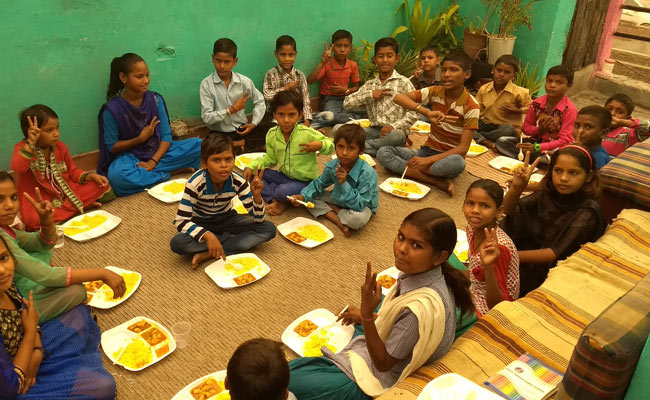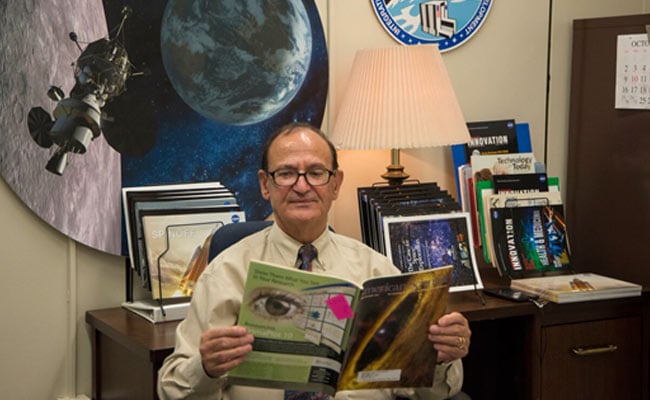
India-born American NASA scientist Dr Kumar Krishen with the children at Surdas village
New Delhi:
Last Sunday, nearly 40 children from underprivileged background attended an unusual educational programme in a small village of Faridabad, Haryana. For some of the kids, this was probably the first brush with formal education since they belong to the families that cannot even afford to send their children to a state-run school. The educational initiative at Surdas village - aimed to extricate these kids out of the cycle of poverty and deprivation - is the brainchild of India-born American Dr Kumar Krishen who is employed with the NASA (National Aeronautics and Space Administration) as a senior scientist / lead technologist for the Exploration Technology Office at Johnson Space Center in the US.
For Krishen, this programme was one of the many events he attends during his biennial visits for the underprivileged children in small villages or towns of India. "I try and visit India at least once in two years and pay visits to some schools and colleges, primarily to spend time with students, motivate them and help some of them financially," said Dr. Krishen.
In some cases, parents of the kids, who attended the workshop in Faridabad, are constrained to borrow money and the repayment can be made only when the children, too, lend a helping hand to the parents in earning the bread for the family.
When asked what motivates him to travel across the ocean for these interactive sessions with underprivileged kids, he explained, "I still remember that I was privileged enough to receive free education in India before I made it to Kansas State University for a Master's degree followed by a PhD in electronics and Radiophysics. During my trips to India, I try to give back to the society by helping some students from needy families to continue their education."
While commenting on the sordid state of affairs of Indian society, stemming from the poor quality of education, Krishen remarked that the problem lies in the basic mindset that, "A worker's child should become a worker, or a farmer's child should only become a farmer. We need to break this cycle and that can happen though education. And even if a farmer's son wants to become a farmer, he must get educated to keep pace with the changing technology. These days, farming sees lots of innovations with machines and solar appliances," he told NDTV. "Farming is being done in an efficient manner. Farming will also need skilled workers who are familiar with the details of health, nutrients, preservation and distribution system," he added.
While speaking about how he zeroed in on Surdas village of Faridabad, Dr Krishen recalls his first visit to Faridabad a few years ago when he had come down to deliver a motivational lecture to the students of Diksha Senior Secondary School .
"I happened to see little children working in the fields. It bothered me a lot. These children should have been studying at this age. This is the time for them to learn," Dr. Krishen thought. And from there the initial work for the project commenced.
 These children are part of the tutoring programme offered by Dr. Krishen
These children are part of the tutoring programme offered by Dr. Krishen
During these trips to India, he has travelled across the length and breadth of the country. Talking about the challenges he faces during the visits, he said, "The challenge I have is to make highly talented Indian professionals be open-minded to various ideas. I encounter resistance from them in terms of considering various ideas and options. Let me give an example. I was talking to a politician and told him that we can develop innovative solar powered devices to keep farm workers comfortable in high temperatures. He looked at me and said, 'farm workers in this nation are used to working in very high temperatures.' I also think that some of those I interact with undermine their capabilities and put themselves down when I know that they are highly intelligent."
His Career
 Dr. Kumar Krishen
Dr. Kumar Krishen
Dr. Krishen hails from a small village in Jammu and Kashmir (J&K) and completed his graduation from the erstwhile Jammu and Kashmir (J&K) University. Later, he went to Calcutta University for a Master's degree in Electronics and Radiophysics.
After that, he went to Kansas State University on a scholarship (assistantship). The then Prime Minister of India, Lal Bahadur Shastri funded his travelling expenses, he tells.
Then he worked on a NASA contract at Lockheed Electronics Company in Houston till February 1976 before he took up a stable job at NASA's Johnson Space Research Center where he completed 40 years in February 2016.
Dr. Krishen designed advanced original concepts concerning remote sensing, health systems, science payloads, sensor systems, communications and tracking systems, mission support technologies, and automation and robotics technologies. Research and engineering efforts of Dr. Krishen have been used in several experiments on Skylab, Seasat, and Shuttle, and have resulted in over 170 technical papers/presentations/reports - 60 of which have been published in books, technical journals, or society proceedings.
(This article was first published on November 16, 2017 and was updated several times thereafter)
Click here for more Education News
For Krishen, this programme was one of the many events he attends during his biennial visits for the underprivileged children in small villages or towns of India. "I try and visit India at least once in two years and pay visits to some schools and colleges, primarily to spend time with students, motivate them and help some of them financially," said Dr. Krishen.
In some cases, parents of the kids, who attended the workshop in Faridabad, are constrained to borrow money and the repayment can be made only when the children, too, lend a helping hand to the parents in earning the bread for the family.
When asked what motivates him to travel across the ocean for these interactive sessions with underprivileged kids, he explained, "I still remember that I was privileged enough to receive free education in India before I made it to Kansas State University for a Master's degree followed by a PhD in electronics and Radiophysics. During my trips to India, I try to give back to the society by helping some students from needy families to continue their education."
While commenting on the sordid state of affairs of Indian society, stemming from the poor quality of education, Krishen remarked that the problem lies in the basic mindset that, "A worker's child should become a worker, or a farmer's child should only become a farmer. We need to break this cycle and that can happen though education. And even if a farmer's son wants to become a farmer, he must get educated to keep pace with the changing technology. These days, farming sees lots of innovations with machines and solar appliances," he told NDTV. "Farming is being done in an efficient manner. Farming will also need skilled workers who are familiar with the details of health, nutrients, preservation and distribution system," he added.
While speaking about how he zeroed in on Surdas village of Faridabad, Dr Krishen recalls his first visit to Faridabad a few years ago when he had come down to deliver a motivational lecture to the students of Diksha Senior Secondary School .
"I happened to see little children working in the fields. It bothered me a lot. These children should have been studying at this age. This is the time for them to learn," Dr. Krishen thought. And from there the initial work for the project commenced.

During these trips to India, he has travelled across the length and breadth of the country. Talking about the challenges he faces during the visits, he said, "The challenge I have is to make highly talented Indian professionals be open-minded to various ideas. I encounter resistance from them in terms of considering various ideas and options. Let me give an example. I was talking to a politician and told him that we can develop innovative solar powered devices to keep farm workers comfortable in high temperatures. He looked at me and said, 'farm workers in this nation are used to working in very high temperatures.' I also think that some of those I interact with undermine their capabilities and put themselves down when I know that they are highly intelligent."
His Career

Dr. Krishen hails from a small village in Jammu and Kashmir (J&K) and completed his graduation from the erstwhile Jammu and Kashmir (J&K) University. Later, he went to Calcutta University for a Master's degree in Electronics and Radiophysics.
After that, he went to Kansas State University on a scholarship (assistantship). The then Prime Minister of India, Lal Bahadur Shastri funded his travelling expenses, he tells.
Then he worked on a NASA contract at Lockheed Electronics Company in Houston till February 1976 before he took up a stable job at NASA's Johnson Space Research Center where he completed 40 years in February 2016.
Dr. Krishen designed advanced original concepts concerning remote sensing, health systems, science payloads, sensor systems, communications and tracking systems, mission support technologies, and automation and robotics technologies. Research and engineering efforts of Dr. Krishen have been used in several experiments on Skylab, Seasat, and Shuttle, and have resulted in over 170 technical papers/presentations/reports - 60 of which have been published in books, technical journals, or society proceedings.
(This article was first published on November 16, 2017 and was updated several times thereafter)
Click here for more Education News

